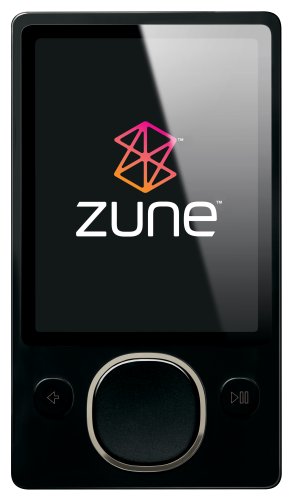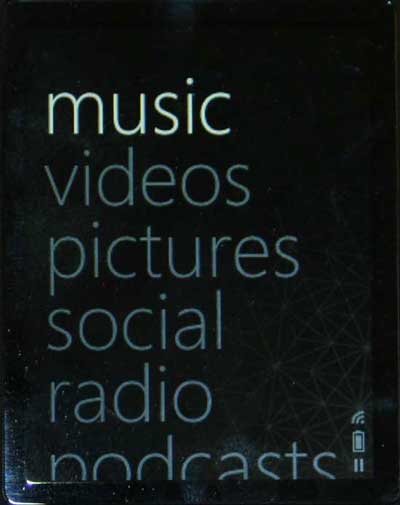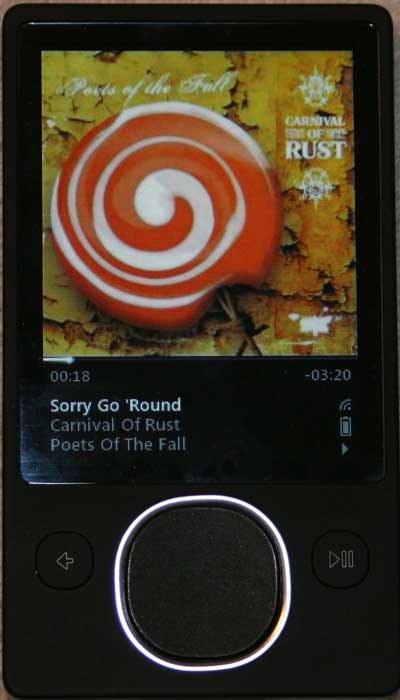iPod vs. Zune: January 2008 High End MP3 Player Roundup
by Ryan Smith on January 21, 2008 12:00 AM EST- Posted in
- Smartphones
- Mobile
Zune 80
Last but certainly not least we have Microsoft's second-generation Zune, the Zune 80. If the iPod Classic is the old guard and the iPod Touch the new guard, then the Zune is the missing link, as its feature set includes items from both generations of products, with interesting results.

As the successor to the original Zune (30) which was developed prior to the Touch, the Zune 80 is best described as an attempt to build a bigger, better iPod Classic; AKA the proverbial iPod killer. The original Zune launched with fairly tepid reviews thanks to a combination of poor design choices with both the hardware and the software. Since then Microsoft has gone back to the drawing board and heavily revised the Zune's hardware for the Zune 80, and taken out many of the kinks in the Zune software, which has also been pushed out to the original Zune as an update. The result is that their second generation Zune is immediately a much stronger contender than the original Zune was.
At $249 for the Zune 80, the Zune 80 is clearly targeted against the 80GB iPod Classic which retails at the same price and features the same 80GB 1.8" hard drive. Microsoft seems content to leave Apple alone at the $349 price point for the 160GB iPod Classic.
One of the biggest complaints with the original Zune was the controls, and that's where we'll start. The original Zune used a d-pad in the shape of a circle along with buttons on the left and right sides, something that would seem to be more at home on a Windows Mobile PDA than a MP3 player. The d-pad's successor in the Zune 80 is a touch-sensitive pad (the Zune Pad) in the shape of a squircle. Notably, the Zune Pad is only a single button, emulating the previous Zune's d-pad by reading the location of the thumb when the Zune Pad is pressed.
On the whole the Zune Pad is a mixed bag. The lack of touch controls on the original Zune were a massive mistake and this makes up for it greatly, as it's now far easier to quickly navigate through lists thanks to the ability to flick your finger along the Zune Pad to launch the list up or down. The biggest shortcoming in its design however is the Zune Pad just isn't very accurate. Because the Zune Pad uses touch loaction to figure out what d-pad action it should be emulating (or if it should be emulating a centered button press), we continue to have periodic issues accidentally scrolling up/down as we press the button because the Zune Pad reads our thumb actions as a flick while we're pressing the button. Through a month's practice we've learned how to better work with the Zune Pad to try to avoid such accidents, but we haven't been able to stop them completely. This particularly manifests itself during blind navigation, making that task harder than it should be.
Less significant is the fact that Zune Pad is hard to get a read on in terms of sensitivity; every now and then the Zune Pad is reading small motions as bigger than they are meant to be. Much of this has to do with the fact that the Zune Pad is fairly small (1" diameter) and requires repeated motions to use, so the device has brief 1" motions to decide what's going on. In all fairness to Microsoft, this is a case where they're between a rock and a hard place with what Apple has done. The iPod scroll wheel is simply a fantastic design, it's very comfortable and easy to use, with no significant problems in our opinion and none of the issues we've had with the Zune Pad. But we believe Microsoft can't outright copy the scroll wheel both because Apple's legal team probably won't let the idea go without a fight and because there's a certain level of harm that would come to Microsoft's reputation if it was such an obvious copy.
So what we get is the Zune Pad, to the detriment of the Zune 80. Don't get us wrong, it's not terrible (if you want terrible ask us about a Rio, any of them), it's just not great either; it's better than the first Zune and still not as good as the competition. Ultimately it's not possible to avoid fighting with the Zune Pad at least once, which is a tough sell in the iPod age. We should note that you can turn the touch-sensitive features of the Zune Pad off, which would solve some of our problems, but then we'd just be back to a d-pad.
Moving on, we come to the UI of the Zune. In all honesty we don't have much to say about the UI because we're largely content with it. Its anti-iPod design is rather obvious at times, starting with the white-on-black design compared to the iPod's black-on-white design, but at the end of the day it accomplishes the same things and works out rather well. Hierarchies are very solid designs for a MP3 player interface, and this is what Microsoft sticks to. If you've used any other MP3 player then you're not going to immediately know where everything is, but once you've used one hierarchical design you've basically used them all and will quickly adapt to the Zune.

The only thing keeping us from calling the Zune UI a draw with the iPod Classic's (it's basically incomparable to the Touch) are two nagging issues with it that we're having. First is a matter of design, Microsoft decided to shorten the hierarchy some by making song groupings a horizontal list across the top with the elements appearing below, skipping the need to actually traverse deeper. In practice this saves a short amount of time traversing the UI, but it also has the side effect of not making all of the groupings visible at once. What are the grouping methods and how many clicks/flicks do we need to make to get to the one we want? Because they're not all on the screen at once, you can't tell without going through them all. It's only a problem for new users, but it's a problem none the less.

The other issue we have is with the responsiveness of the UI. Most of the time it's fast, but not always; certain actions such as traversing through the song grouping methods too quickly will result in a UI that feels sluggish - never slow but sluggish. It's not enough to significantly impact the usability of the Zune, but it is enough to be annoying. Who ever heard of a MP3 player being sluggish? It just shouldn't be happening.










50 Comments
View All Comments
TedKord - Tuesday, January 22, 2008 - link
I have a bunch of mp3, ogg and flac tunes already on my computer. With my A2, I just highlighted them all, drag and drop. MUCH simpler than reencoding for the Ipod, which has crapier sound quality anyway.BigLan - Tuesday, January 22, 2008 - link
I think the biggest use of an fm tuner today is for watching TV at the gym. Sure, you could listen to your own music but a lot of people want to watch the TV as well. This alone was the reason I got my wife a Sansa last year instead of a nano.TedKord - Tuesday, January 22, 2008 - link
TV with an FM tuner?strikeback03 - Wednesday, January 23, 2008 - link
I'd imagine the sound for the TV stations is broadcast over short range with FM. Same thing is used at drive-in movies.Locutus465 - Monday, January 21, 2008 - link
this is exactly what I was looking for in a mp3 player review... I actually had a lot to say, but my router decided to take a dive right when I was going to submit it, and now it is gone :(Basically, I'm torn by the coolness of the touch and the superiority (IMHO) of Zune softare as compared to iTunes (particularly it's preformance on 32 & 64 bit Vista). In the end, for me the superiority of Zune is kind of winning out. At the end of the day, buying mp3's and getting them on my iPod and burnt CD all needs to just work and not be a pain.
The one thing MS lacks and needs to get into Zune is a good video store. IMO they should make XBL video store 100% accessable to Zune, and movies should be playable not only on zune, but also over your network to an x-box 360 and other media extender. If they did this the would be in a very strong position against both sony and apple at the same time with a single vendor solution that competes with iPod, PS3 and Apple TV all at the same time.
Tegeril - Tuesday, January 22, 2008 - link
The latest version of iTunes (7.6), works quite well in both 32 and 64 bit.Locutus465 - Tuesday, January 22, 2008 - link
I suppose that I'm a bit wary since versions 7.0-7.5 didn't work and eventually after repeated upgrades iTunes on the desktop has gotten to the point of displaying an error on start up saying cd-burning and some other function are broke. I have 7.6 on my laptop and it seems to work though, so we'll see.Locutus465 - Wednesday, January 23, 2008 - link
Just needed to post back an update on this...Holy toledo!!!! iTunes *FINALLY* works as advertised on Vista, though I noticed it (very sadly) installed the Bojour service on my vista 64 machine (probably 32 as well though I did not notice). I dislike the bundling over which I had no control, leaves a very bad taste in my mouth...
That said, at least iTunes *FINALLY* does work!!! I'm not sure though if that's enough to push me back towards iPod touch (as cool as it is) though... I've already discovered the conviniance of a flat monthly fee allowing me to download as much music as I want through Zune. Apple would need a similar set up to kill off Zune in my book. But at least it works, now I just need to take a closer look at Mp3 players once I'm a better position to be buying tech again.
Baked - Monday, January 21, 2008 - link
Did you read what you wrote? You actually think an Apple Fanboy, who bought a Mac, would go out and buy a Zune, and not an iPod. Why would anybody w/ a Mac, go out and buy a Zune instead of an iPod? >_<
Market share? What market share? There are still far more people using PC notebook than Apple notebooks.
michael2k - Tuesday, January 22, 2008 - link
Last count in the US was 6 to 7 percent, or 1/12 of the population.In other words, there are more Mac users, out of PC users, than there are Zune users out of iPod users.
And if you look ONLY at notebooks, I think the number rises to something like 12%. As of last March it was 10%:
http://blogs.zdnet.com/Apple/?p=519">http://blogs.zdnet.com/Apple/?p=519
Or 1 in 10 people in the US who own notebooks own a Mac notebook. Which puts it in good company alongside Dell and HP.